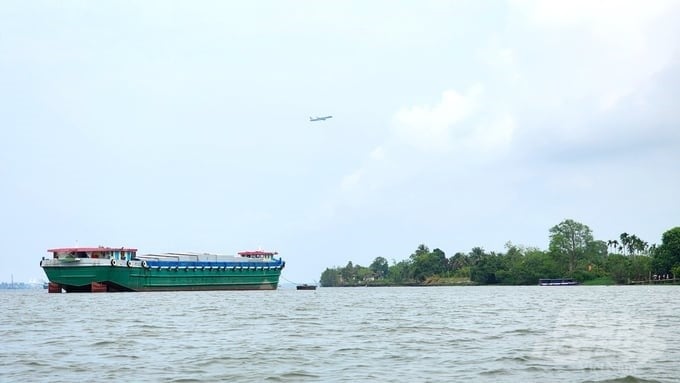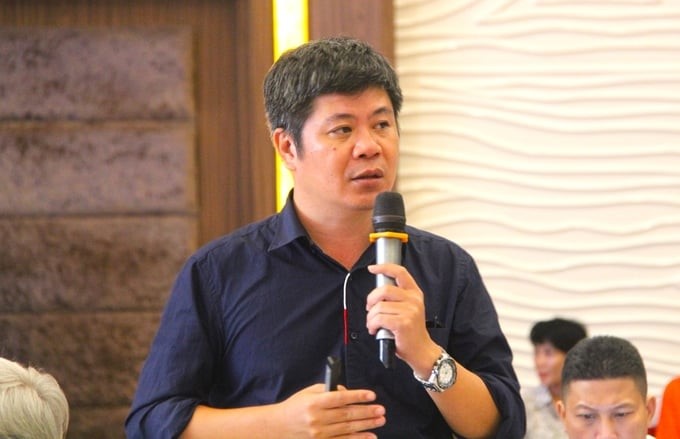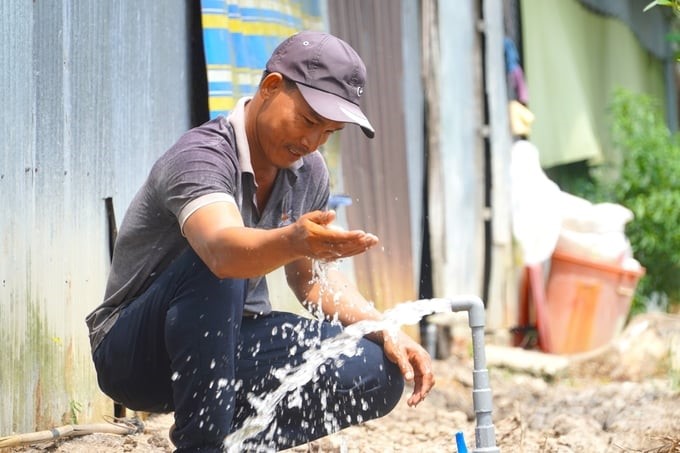June 2, 2025 | 14:34 GMT +7
June 2, 2025 | 14:34 GMT +7
Hotline: 0913.378.918
June 2, 2025 | 14:34 GMT +7
Hotline: 0913.378.918
According to Mr. Nguyen Hong Hieu, Deputy Director of the Department of Water Resources Management (Ministry of Natural Resources and Environment), in the 1980–2023 period, every year, the total flow of the Mekong River transfers over 443 billion m3 of water into the Mekong Delta, and the region's endogenous water is about 32 billion m3. Thus, surface water resources for the region depend on the water source upstream of the Mekong River.

Surface water resources for the Mekong Delta region depend on the water source upstream of the Mekong River. Photo: Kim Anh.
Therefore, mining activities upstream of the Mekong River basin have been at direct risk of reducing water sources flowing into Vietnam.
As for groundwater resources, the potential reserve throughout the basin reaches approximately 72 million m3/day. Of which, the exploitable groundwater reserve is about 7.8 million m3/day.
Along with the problems of flow reduction, saltwater intrusion, and the risk of cross-border pollution, water resources in the Mekong Delta are under pressure from internal economic development activities such as domestic wastewater, aquaculture and seafood processing, livestock farming, crop production, industrial production, etc. This poses a big challenge in terms of water sources for the Mekong Delta, especially in the current context of severe drought and saltwater intrusion.
Dr. Nguyen Ngoc Huy, a research expert on extreme climate and natural disasters, has conducted thorough research on rainfall. He assessed that a large amount of rainfall that can be used is between 1,600 and possibly up to 2,400mm.

Dr. Nguyen Ngoc Huy, a research expert on extreme climate and natural disasters, raised the problem, "Why is there water in the rivers and water in the sky, but the Mekong Delta lacks water?". Photo: Kim Anh.
However, the question raised by Mr. Huy is why this rainfall has not been included in plans to take advantage of it.
"There is water in the rivers and water in the sky, so why is there a lack of water? The problem here is not knowing how to conserve water. Currently, people keep water mainly in canals. Meanwhile, wastewater, rainwater, and river water, which are unusable water sources due to pollution and salinity, also flow into canals," Mr. Huy analyzed.
During the actual survey in coastal areas or downstream areas, where people have difficulty on accessing water sources, Mr. Huy clearly realized that people had to exploit groundwater.
Meanwhile, some proposed solutions stipulate that people are not allowed to exploit groundwater. According to Mr. Huy, this sanction is not appropriate and cannot be implemented. Therefore, to solve the water source problem for the Mekong Delta region, this expert said that building reservoirs to retain water during the dry season needs to be calculated.
For further analysis, Mr. Huy said that the rainy season ends in November 2023 and lasts until the end of April 2024. Thus, the water shortage will last several months, and reservoirs must be strictly protected for use during this period. Besides, localities and specialized agencies need to think about classifying water sources for living and production.

One of the immediate and long-term solutions to the water source problem in the Mekong Delta is to change people's awareness of water use. Photo: Kim Anh.
In Ca Mau province, nearly 100% of domestic water now comes from surface water resources. Having experienced drought and saltwater intrusion sessions, this locality clearly realizes that changing people's awareness of water use is very important.
According to Mr. Le Van Su, Vice Chairman of the Ca Mau Provincial People's Committee, the locality has implemented many immediate and long-term solutions to encourage people to use water economically and know how to conserve water resources.
“In fact, the current price of domestic water used by rural people is limited to VND 5,000–7,000/m3. When people are forced to pay VND 15,000/m3 of water, then will they think about saving or storing rainwater for use," said Mr. Su.
Currently, Ca Mau province is focusing on water supply for about 3,300 households in difficult areas. At the same time, the province is implementing a project to improve on-spot water storage capacity by encouraging people to store water on household and community scales. This both contributes to changing awareness and helps to improve water storage capacity for local people.
Translated by Thu Huyen

(VAN) Novel process harnesses machine learning to reveal groups of genes that determine how efficiently plants use nitrogen.

(VAN) Several scientists and farmers are experimenting with soil treatment in some key durian-growing regions such as Cai Lay (Tien Giang), Dak Song, Gia Nghia, and Dak R’lap (Dak Nong).
/2025/05/25/4127-3-073637_820.jpg)
(VAN) Thanks to the promotion from an FAO-implemented project, vegetable production in greenhouses in Moc Chau has seen strong development, from 1.5 hectares in 2021 to nearly 50 hectares in 2024.

(VAN) FAO has recently supported USD 140,000 to implement the project 'Risk mitigation human-animal interface risks through disease control initiatives in pig farming.'

(VAN) The People's Committee of Tra Vinh province has approved an adjustment to the investment policy for the Green Hydrogen Plant project, increasing its area to approximately 52.76 hectares.
![Reducing emissions from rice fields: [2] Farmers’ commitment to the soil](https://t.ex-cdn.com/nongnghiepmoitruong.vn/608w/files/news/2025/05/05/dsc08881jpg-nongnghiep-140632.jpg)
(VAN) Clean rice cultivation model in Thuong Tan commune, Bac Tan Uyen district, is assisting local residents in achieving sustainable agriculture by substantially reducing costs, increasing productivity, and protecting the environment.

(VAN) At the conference to disseminate Resolution No. 68, AgriS introduced its digital agricultural ecosystem and reaffirmed its commitment to accompanying the Government in promoting private sector development and sustainable agriculture.